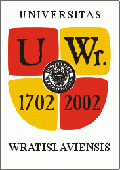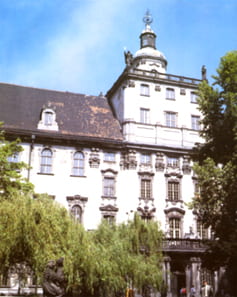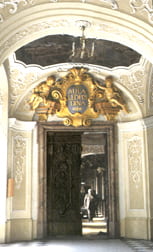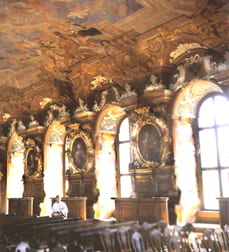 The Wroclaw’s Town Council decided to establish Wroclaw University (largest city in Silesia, a region in southwestern Poland) in the 16th century. Due to their efforts on July 20, 1505, Wladyslaw Jagiellonczyk (from Polish-Lithuanian dynasty), king of Bohemia and Hungary, signed the foundation deed of a new University. Yet the vigorous opposition from Cracow University put an end to this undertaking. It was only after two hundred years later that a small Jesuit academy – with two faculties (Philology and Theology) – was established in 1702 by the Emperor Leopold I Habsburg, and named, after him, the Leopoldine Academy.
The Wroclaw’s Town Council decided to establish Wroclaw University (largest city in Silesia, a region in southwestern Poland) in the 16th century. Due to their efforts on July 20, 1505, Wladyslaw Jagiellonczyk (from Polish-Lithuanian dynasty), king of Bohemia and Hungary, signed the foundation deed of a new University. Yet the vigorous opposition from Cracow University put an end to this undertaking. It was only after two hundred years later that a small Jesuit academy – with two faculties (Philology and Theology) – was established in 1702 by the Emperor Leopold I Habsburg, and named, after him, the Leopoldine Academy.
In the second half of the nineteenth century numerous scholars of international renown lectured at Wroclaw  University: E. Buchner (chemistry), R. W. Bunsen (chemistry), P.G. Dirichlet (mathematics), J. G. Galle (astronomy), A. Hillebrandt (classical philology), G. R. Kirchhoff (physics), E. Kummer (mathematics), T. Mommsen (history, law), J. Partsch (geography), J. E. Purkynje (physiology), R. Roepell (history), C. T. Siebold (zoology), and H. Steffens (physics).
University: E. Buchner (chemistry), R. W. Bunsen (chemistry), P.G. Dirichlet (mathematics), J. G. Galle (astronomy), A. Hillebrandt (classical philology), G. R. Kirchhoff (physics), E. Kummer (mathematics), T. Mommsen (history, law), J. Partsch (geography), J. E. Purkynje (physiology), R. Roepell (history), C. T. Siebold (zoology), and H. Steffens (physics).
The Nobel Prize Connection. The following professors and students from Wroclaw University were awarded the coveted prize: Theodor Mommsen (literature, 1902), Philip Lennard (physics, 1905), Eduard Buchner (chemistry, 1907), Paul Ehrlich (medicine, 1908), Fritz Haber (chemistry, 1918), Friedrich Bergius (chemistry, 1931), Otto Stern (physics, 1943), Max Born (physics, 1954).


Baroque style Leopold’s Chamber where the graduation ceremonies and classical music events continue to take place

A conferral of my Ph.D. at Leopold’s Chamber, 1978
